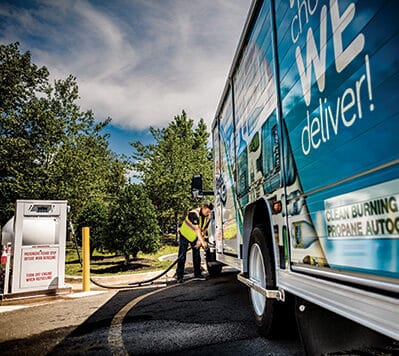Head to Head: Propane Autogas vs. Diesel Vehicles
Are the deficiencies of diesel getting you down? Is it time for a change? Business owners that have made the switch from diesel to autogas have bucked the trend over a century in the making. When comparing propane autogas to diesel, it’s important to look back in time. The first automobile was sold in the United States in 1896. Therefore, the support of gasoline (and diesel) engines have been approximately 125 years in the making.
Shortly after the first vehicle was introduced in the United States, there became a need to service these historically unreliable (at the time) vehicles. Wheeled vehicles by nature prefer to travel on roads, and as roads were constructed, repair facilities and gas stations arose to service this mobile industry. Petroleum refining plants were built based on population densities and consumer needs, while pipelines and railways were constructed to meet these new demands.
Fast-forward to today when the American Petroleum Institute estimates that there are more than 145,000 service stations in the United States. History and the latticework of roadways have afforded diesel engines and their drivers the opportunity to stop practically anywhere for fuel. This makes diesel a more convenient solution but perhaps not the best one.
Enter propane. When evaluated in a vacuum, propane’s advantages over diesel become obvious. Autogas is cleaner, cheaper, and quieter than diesel. The core advantages of propane autogas over diesel vehicles are basically the same advantages that autogas over conventional gasoline engines. Combined with the lower cost of fuel, propane vehicles have the lowest total cost of ownership among the major fuel types.
Advancements continue with autogas engines as more money and research strive to make autogas more mainstream. These advancements, including renewable propane, have some asking the question, could propane be the new diesel?
- Cost
Propane is consistently more affordable than gasoline, and those fuel savings can add up to thousands of dollars each year. Also, propane prices stay more stable over time, creating less uncertainty associated with fuel costs. Propane suppliers have the ability to lock in pricing for months or even years, resulting in better budget estimates. Additionally, propane engines require less maintenance than other fuel systems, which means less downtime for repairs and routine maintenance. - Emissions
Propane is one of the cleanest burning fuels, making it much safer for the environment than gasoline, diesel or even electricity. Propane engines have been proven to significantly reduce greenhouse gas and NOx emissions when compared to other fuel types. By producing fewer emissions, your vehicles offer wellness benefits to drivers, community members, and the surrounding environment. - On-Site Refueling
Another benefit of propane is the convenient fueling options it provides. Many fleet managers have marveled at the convenience and loss of waste associated with on-site refueling. Complete versatility and transparency are achievable without lost receipts and other hassles of off-site refueling. Your local propane dealer will be able to discuss the different options and help you decide which refueling method best meets your needs. - Versatility
Propane is used for light and medium-duty fleet vehicles throughout the country, with proven results. Construction companies, law enforcement agencies, and taxicab fleets across America have reaped the benefits of propane in their light-duty vehicles. Propane can also fuel medium-duty vehicles, as with food and beverage delivery and transit services. Once business owners discover the benefits of propane, they often convert their entire fleet. Propane-powered vehicles are available from manufacturers as OEM-dedicated models, but existing fleets can also be converted to propane with certified aftermarket conversion kits. - Driver Satisfaction
A hot topic circulating amongst fleet managers these days is driver retention. Refueling with autogas is clean. Drivers who have made the switch are heard to comment that they appreciate not smelling like diesel after a fill-up. Also, more infrequent fill-ups leads to more time on the road and more money in their pockets.
Managers today are presented with numerous decisions daily. For those looking to maintain profitability while going green, propane autogas can check all the boxes. Autogas is cleaner, cheaper, and quieter than diesel.
